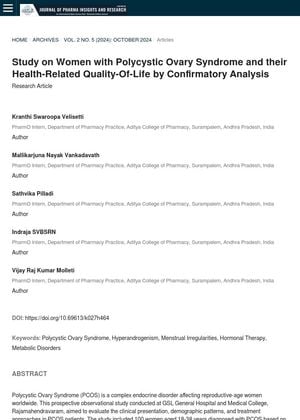Study on Women with Polycystic Ovary Syndrome and Their Health-Related Quality of Life by Confirmatory Analysis
October 2024

TLDR Women with PCOS often face menstrual issues, weight gain, and stress, affecting their quality of life.
This study investigated the health-related quality of life in women with Polycystic Ovary Syndrome (PCOS) by analyzing clinical presentations, demographic patterns, and treatment approaches in 100 women aged 18-38 years. Conducted at GSL General Hospital and Medical College, the study found that 52% of participants were aged 18-23, and 64% experienced weight gain post-diagnosis. Irregular menstrual cycles were prevalent in 87% of the women, with common symptoms including white discharge (78%), mental stress (56%), and hair loss (55%). Significant associations were found between PCOS and menstrual irregularities. Treatment primarily involved hormonal therapy, insulin sensitizers, and lifestyle changes, with common prescriptions including cyproterone acetate with ethinyl estradiol, metformin with myo-inositol, and progesterone agents.



